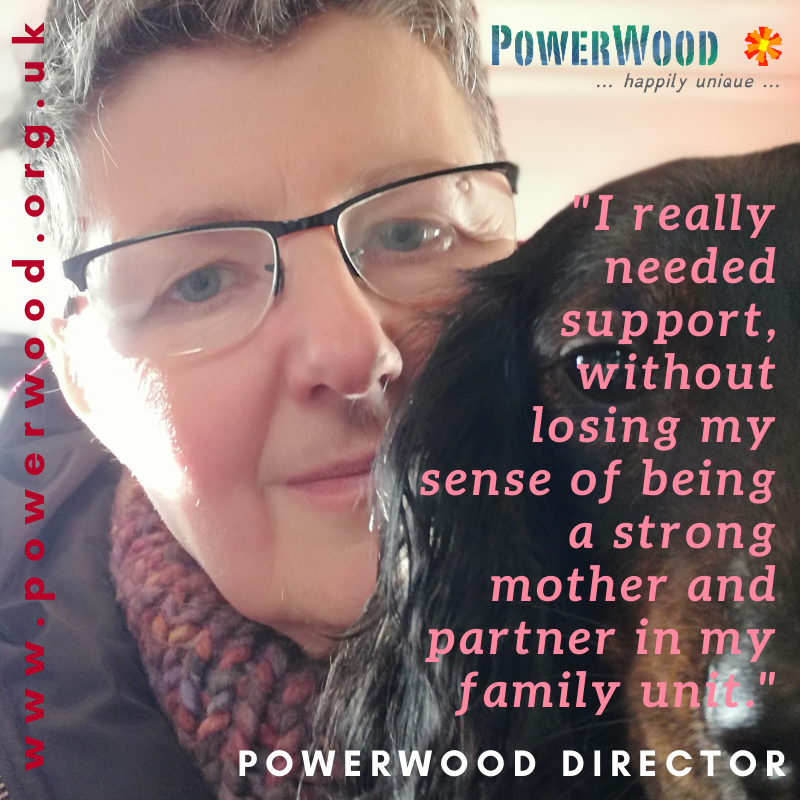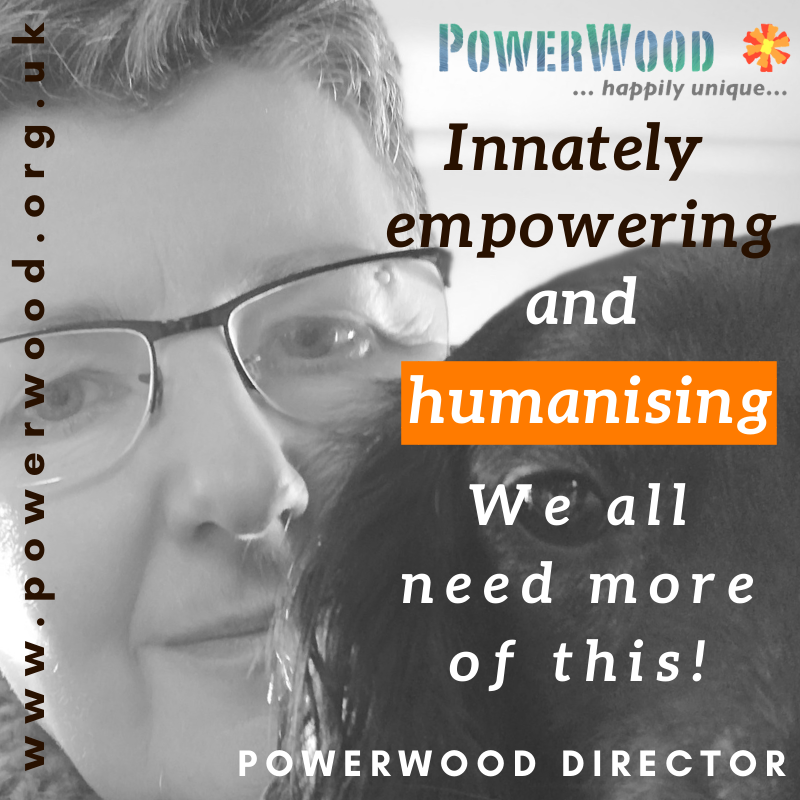Interview with PowerWood’s Director Carolyn Sargentson
I had seen Simone’s [founder of PowerWood] stand at a home education camp – our son was home-educated from birth to almost 17 years old. At that time I walked past, not knowing how relevant Simone’s knowledge was to our family. A while later a friend with whom Simone had worked said a few times that my son and I would get a lot our of talking with Simone. I had simply not registered that we were both highly sensitive, emotional and super-reactive. I just thought our way of being was completely ‘normal’ (whatever that means). My friend persisted until I ended up having a series of sessions for myself, and also for our son. And my partner attended a weekend workshop too – we all benefitted.
Concept of OEs completely fascinating
I loved how open Simone was, non-judgmental, curious and so warmly supportive. I found the concept of OE’s completely fascinating – once I had learned about them they made sense of my whole family – both sides, all generations. And I loved the idea of having a coach-counsellor, someone who could advise and help me understand what was going on through this new language. I really needed support, without losing my sense of being a strong mother and partner in my family unit.
 From ‘over-sensitive’ to being appreciative of my OE’s
From ‘over-sensitive’ to being appreciative of my OE’s
I have all OE’s to some degree – I am emotionally OE so go straight to my feelings, am sensitive and sentimental. I weep easily. I am deeply empathetic (which, like many OE’s, is a great quality once one has learned to maintain healthy boundaries). I am intellectually OE so get very excited when talking to people about ideas and experiences – this means I am valued as a teacher and communicator. The imaginational OE – oh the horrors of thinking the worst when someone is late or withdraws a bit, and the nightmares about drowning etc. I’ve also a bit of psycho-motor OE – I need to move, am really interested in embodied experiences (I am a yoga teacher among other things) and one of my favourite ways to unwind is to walk alone or with a companion. And my knitting and textile passions are part of a sensual OE. Once I understood myself in these terms I was so much happier, having been described throughout my childhood as over-excitable and over-sensitive by protective parents who – of course – had a bit of imaginational OE and more going on themselves.
Changed the way I perceived and understood my family
Simone completely changed the way I perceived and understood my family. Her coaching helped me engage with my son in much more helpful ways, especially when he really needed me; I also came to understand myself and my partner and our abilities and ‘blind spots’ much more clearly; and I came to understand myself more compassionately.
As a result, I am less drawn into old patterns and pathways and I can see choices now in how I respond. I could never have learned this from a book, or from a friend – the 1:1 approach really worked for me.
Unshakable in that moment
One moment of learning stands out. My son had got involved in some kind of scrap with another kid at a PowerWood event some years ago; things blew up. Simone came and sat down with him, and asked him some clear, direct, important questions about what he was feeling, and what the other kid was likely to be feeling. I found it impossible not to jump in and answer for my son. Simone asked me not too, firmly but kindly, and I realised that it is OK to deal with difficult conversations and that they need time and space.
There was something about how unshakable Simone was in that moment, so totally open to whatever was going to be said, and so grounded in her own knowledge that she could deal with whatever came up by remaining calm and open and curious. There was no blame, just a conversation that led to deeper insight. Such a contrast to my own anxiety and fear in that moment, my over-protectiveness, and my inability to give my son the space he needed to learn how to express himself in tricky situations. I think I’m still learning from that moment.
Huge implications for just about all aspects of life
 There is so much value in PowerWood’s ideas – having a clear framework for understanding over-excitabilities is one thing. We use the language at home even now – for example, not surprisingly we now have an OE dog (she chose us of course)! I love the inter-connectedness of the theories that Simone uses and the over-arching MERT framework. Overall I think that I treasure the way the work empowers us as parents and individuals, and – for me at least – invites us to be more courageous and less fearful about our lives and relationships. Yes my relationship with my son was transformed, but the ideas of Powerwood have huge implications for just about all aspects of life.
There is so much value in PowerWood’s ideas – having a clear framework for understanding over-excitabilities is one thing. We use the language at home even now – for example, not surprisingly we now have an OE dog (she chose us of course)! I love the inter-connectedness of the theories that Simone uses and the over-arching MERT framework. Overall I think that I treasure the way the work empowers us as parents and individuals, and – for me at least – invites us to be more courageous and less fearful about our lives and relationships. Yes my relationship with my son was transformed, but the ideas of Powerwood have huge implications for just about all aspects of life.
Probably Simone’s Cycle of Sensory and Emotional Overload stands out the most to me because that idea of safety, and the false sense of safety generating unwelcome behaviours, seems to apply to children and adults alike, all the way through life. I come back to it often, in relation to myself, my family and those outside the family too including people I work with. It’s very powerful
The widest possible impact
It’s great to be able to support Simone as a fellow director – she does so much, and it is a good feeling to help her hold the operation together, reflecting together, thinking forward, rethinking aspects of our offers so they fit our community best. And we the directors – it’s a great partnership; we are all different and that means Simone can draw on our experiences and expertise as she needs to. We all support each other, respect and value what each one brings to the table, and we really care about each other too. I feel privileged to be useful so that Powerwood’s work has the widest possible impact, and I’ve learned a lot from the co-director team over the years.
I feel that the PowerWood approach feels very important in the times we live in, with the pressures of family and wider social, educational and professional life. I think it is amazing that Simone has developed these over-lapping, inter-relating theories and methods that don’t pathologize people, that lead us away from the idea there is something wrong with us and/or our children.
“That is innately empowering and humanising; we all need more of this!”
Explore your options or request a Free Introductory Talk with Simone de Hoogh.

